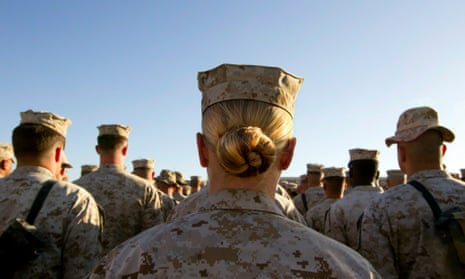If you’re an American high schooler who reads the news, it probably came as no surprise that the US Marines are now having their very own scandal involving a so-called ‘slut page’. Slut pages, or social media pages displaying a collection of nonconsensually shared nudes, are as common in schools today as outbreaks of head lice.
I was recently invited to speak at a middle school that had been having a problem with eighth-grade boys taking “upskirt photos” of their female classmates and posting them online. (Upskirt photos are also a common theme in porn.) What those middle school boys were doing sounds a lot like what a marine reportedly did to obtain some of the photos that appeared on Marines United, a private Facebook page specializing in the nonconsensual sharing of nudes of female service members and veterans.
This marine surreptitiously took photos of a female corporal while she was picking up her gear at Camp Lejeune, North Carolina. His photos reportedly drew dozens of obscene comments from some of the nearly 30,000 followers of the Marines United page, whose membership was limited to male marines, navy corpsmen and British Royal Marines stationed around the world.
Thomas James Brennan, the US Marine Corps veteran who broke the story on his War Horse news site, reported that “hundreds – possibly thousands” of naked photos were shared on the Marines United page, and that more than two dozen active-duty women whose photos were posted there were identified by their full names, ranks and duty stations. The defense department is investigating.
As the US Marine Corps decides how to deal with those responsible for this, it should consider not only the effect it has had on the victims, but what message its response will send to children and teens.
We have a serious problem with the nonconsensual sharing of nudes among kids, and the lack of a clear and consistent response from the adult world isn’t helping. Sometimes the “ringleaders” are reprimanded, and sometimes they are excused as “boys being boys”; sometimes the victims are punished – blamed for taking and sharing nude photos in the first place. “Well, what did she expect?”
Meanwhile, victims suffer a fallout of emotions including humiliation, fear, anxiety and shame; and we have an expanding list of girls who have taken their lives after having a nude photo nonconsensually shared.
There was Amanda Todd; Hope Witsell; Tovona Holton; Destiny Gleason, 14, who hanged herself after a naked photo that was only said to be of her body was shared online. If we can’t find a way to educate kids not to nonconsensually share nudes, we are going to need to erect a monument on which to inscribe all these children’s names.
We need to start seeing the nonconsensual sharing of nudes for what it is: a form of sexual violence. This is not to diminish the sexual violence that takes place in real life. In fact, it is reasonable to ask whether a tolerance for non-consensually shared nudes contributes to the psychology behind sexual violence offline – the operative word being “consent”.
And this is something the marines cannot afford to ignore – not with the defense department reporting that this branch of the military has the highest rate of sexual assault against women, with nearly 8% of female service members assaulted in 2014.
The female marines who were exposed on Marines United will have to deal with the repercussions of this exposure long after the page is gone. (And it was taken down almost immediately by Facebook, after a request from the Marine Corps – unusually quick for Facebook, which has been known to take weeks or months to remove inappropriate pages and porn from its site.)
“This is going to follow me – just like he did,” the woman whose photo was secretly snapped at Camp Lejeune told Brennan. And Brennan has reportedly received death threats since his article was published. This reminded me of a story I heard at a high school out west, where a boy who told on some other boys who were passing around revenge-porn photos on their phones was then ostracized and bullied. And the middle school boy who conceived of the upskirt photos? “He became a hero,” a teacher told me ruefully.
We don’t yet know the ages of the servicemen who non-consensually shared nude photos on Marines United, but I wouldn’t be at all surprised if many of them are still teens. Because this is their culture – this is social media culture, which includes the normalization of the nonconsensual sharing of nudes. And what is that really about?
It’s interesting to note that followers of Marines United, which was created in 2015, began posting the photos only in January 2017 – the same month the Marine Corps started allowing women to join the infantry, a controversial and, in some circles, unpopular development. Posting nudes nonconsensually isn’t about sex. It’s about sexism.

